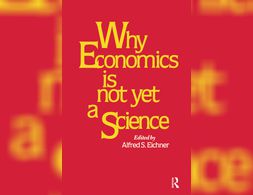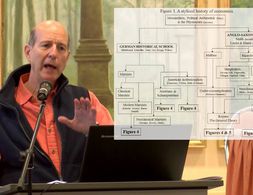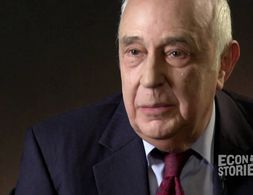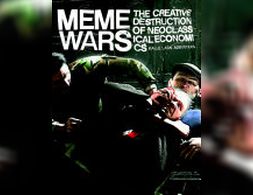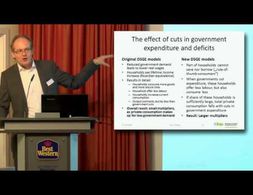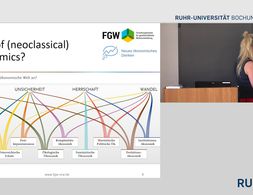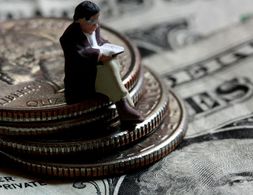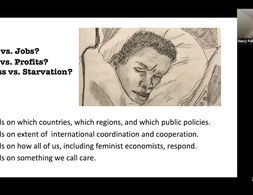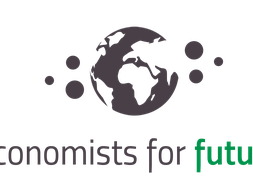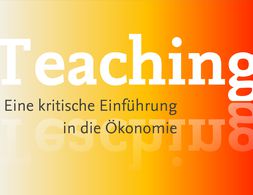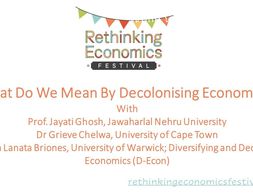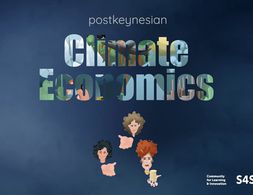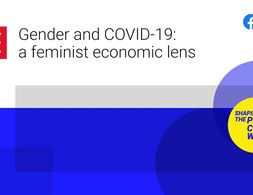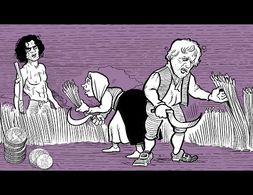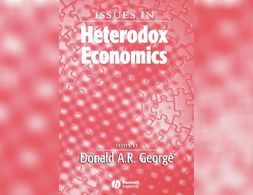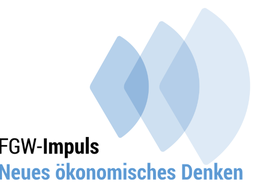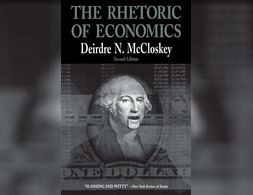1099 Ergebnisse
Jeden Freitag streiken weltweit Schüler/innen für unsere Zukunft. Sie fordern radikale Maßnahmen für die Einhaltung des Pariser Klimaabkommens ein. In diesem Seminar werden wir uns aus der Perspektive der ökologischen Ökonomie mit ihrer Kritik auseinandersetzen. Im Fokus stehen dabei Ansätze einer Postwachstumsökonomie.
Aim of this intensive workshop is to understand macroeconomic workings of climate change as as the background of sustainable finance; to analyse financial assets with ESG (Environmental, Social and Governance) criteria attached to them and their markets and important institutional players; to develop a critical perspective on the current setup of sustainable finance; and to synthesise this knowledge by applying it on in-depth case studies.
First published in 1983. A collection of papers directed at those outside the field of Economics, to open up discussions around the scientific worth of Economics.
Turning the ideas of #DoughnutEconomics into action.
Ihre Erklärungs- und Deutungslogik hat die Ökonomik in der zweiten Hälfte des 20. Jahrhunderts selbstbewusst auf nahezu alle gesellschaftlichen Phänomene ausgedehnt. Auch auf Diskriminierung und Rassismus. Leider dreht sich auch bei diesem Thema die Mainstream-Ökonomik um sich selbst, argumentieren Steffen Haag und Elena Goschin.
Taking as its starting point the interdependence of the economy and the natural environment, this book provides a comprehensive introduction to the emerging field of ecological economics.
Tom Palley provides a very clear and insightful description of the post-Keynesian school of economics by tracing back its connections to the different historical schools of thought.
Reflecting his own concerns about the contribution economics could make to the betterment of society, Eli Ginzberg published this study of Smith's humanitarian views on commerce, industrialism, and labor. Written for his doctoral degree at Columbia University, and originally published as The House of Adam Smith, the book is divided into two parts.
In this video, the most famed biographer of John Maynard Keynes, Robert Skidelsky, explores the foundations of Keynesian economics
From the editor and magazine that started and named the Occupy Wall Street movement Meme Wars The Creative Destruction of Neoclassical Economics is an articulation of what could be the next steps in rethinking and remaking our world that challenges and debunks many of the assumptions of neoclassical economics and …
Critique of neoclassical economics is presented and contrasted with the more realistic assumptions made by an complex adaptive systems and evolutionary approach.
In this lecture Ben Fine aims at stimulating interest for and explaining the relevance of Marxist Political Economy. Ben Fine dedicates the first half of his comprehensible lecture to the question on how mainstream economics became the way it is by explaining its key concepts and how those evolved during the past 150 years. While critically reflecting those concept he also emphasizes that mainstream economics does not consider historical processes. This is the point of departure on his presentation of the core terms and crucial categories of Marxist Political Economy: e.g. the production process and class relations (Part 1). Part 2 examines the consequences of the capitalist mode of production and its propensity to crises. Ben Fine illustrates this Marxist analysis with the example of the current crisis and explains current conditions for the accumulation of capital.
In this lecture Ben Fine aims at stimulating interest for and explaining the relevance of Marxist Political Economy. Ben Fine dedicates the first half of his comprehensible lecture to the question on how mainstream economics became the way it is by explaining its key concepts and how those evolved during the past 150 years. While critically reflecting those concept he also emphasizes that mainstream economics does not consider historical processes. This is the point of departure on his presentation of the core terms and crucial categories of Marxist Political Economy: e.g. the production process and class relations (Part 1). Part 2 examines the consequences of the capitalist mode of production and its propensity to crises. Ben Fine illustrates this Marxist analysis with the example of the current crisis and explains current conditions for the accumulation of capital.
In this lecture Mirowski claims that a good critique of and alternative to neoclassical economics should focus on microeconomics. In addition, he claims that mainstream economics is not about a specific "human nature", instead the understanding of markets (partially based on Hayek) is of special importance. As an alternative Mirowski proposes institutionalist economics that builds upon how markets work nowadays (e.g. links to computer science).
The first keynote speech was given by Sebastian Dullien, current spokesperson of FMM and who is one of the most well-known German economists in applied European economics and a very active contributor to the pluralist debate. Sebastian discusses the strategy of “running with the pack” by using orthodox methods to disseminate pluralist economics and politics. Referring to diverse examples Sebastian addresses the pros and cons of “running with the pack” and proposes alternative approaches to achieve more pluralism in economics.
„Textbook Economics" ist mittlerweile zu einer eigenen Problemkategorie avanciert. Gemeint sind damit die Lehren, die aus dem neoklassischen Standardmodell für die grundständige Bildung, Politikberatung und Öffentlichkeitskommunikation abgeleitet werden.
The article is a formal response to the debate between the economists Diane Coyle and Howard Reed, whose articles were published online by Prospect magazine in 2018. Then, it was taken by Rethinking Economics as representative for the vision of the global network which advocates for changing economics curricula. In fact, it clearly solves some issues within the debate around pluralism by explaining its common misunderstandings among academics and its true - often mislead - meaning.
This is an online panel and discussion on the ongoing and potential gendered impacts of COVID-19 organized by the International Association of Feminist Economics (IAFFE).
The principle of effective demand, and the claim of its validity for a monetary production economy in the short and in the long run, is the core of heterodox macroeconomics, as currently found in all the different strands of post-Keynesian economics (Fundamentalists, Kaleckians, Sraffians, Kaldorians, Institutionalists) and also in some strands of neo-Marxian economics, particularly in the monopoly capitalism and underconsumptionist school In this contribution, we will therefore outline the foundations of the principle of effective demand and its relationship with the respective notion of a capitalist or a monetary production economy in the works of Marx, Kalecki and Keynes. Then we will deal with heterodox short-run macroeconomics and it will provide a simple short-run model which is built on the principle of effective demand, as well as on distribution conflict between different social groups (or classes): rentiers, managers and workers. Finally, we will move to the long run and we will review the integration of the principle of effective demand into heterodox/post-Keynesian approaches towards distribution and growth.
Um die Klimakrise und ihre Ursachen wirklich zu bekämpfen, müssen die derzeitige Wirtschaftsweise grundlegender hinterfragt und Möglichkeiten einer sozial-ökologischen Transformation untersucht werden. Ein Beitrag von Elena Hofferberth.
Ziel dieser kritischen Einführung in die Volkswirtschaft ist es, auf knappem Raum unterschiedliche Sichtweisen auf wirtschaftliche Zusammenhänge darzulegen und damit die Basis für ein differenziertes Verständnis von Ökonomie und wirtschaftspolitischen Debatten zu liefern. In Zeiten einer integrierten Weltwirtschaft, rascher Veränderungen und internationaler Krisen liegt es nahe, Wirtschaft in ihrer internationalen Dimension in den Mittelpunkt zu stellen, anstatt wie gehabt meist nationale Ökonomien isoliert zu betrachten. Miteinander asymmetrisch verbundene Entwicklungen und Veränderungen in Nord und Süd, die auf globaler sowie zwischen nationaler und regionaler Ebene stattfinden, stellen somit einen zentralen Bezugspunkt dar. Daher der Titel des Buches: Ökonomie und internationale Entwicklung.
In this webinar, Dr. Grieve Chelwa, Dr. Cecilia Lanata Briones and Professor Jayati Ghosh discuss what is meant by “Decolonising Economics”.
Teaching feminist economics is a relatively new didactical project posing questions of content and methodology for instructors. The article proposes three possible topics with regard to the changing nature of the emergent research field: introducing feminist economics as a mode of questioning, showing its historicity and spectrum, and asking the question of a unifying paradigm.
This video provides a brief introduction to post-keynesian economics and how the school of thought would tackle climate change.
This lecture takes a look at the consequences of COVID 19 from a feminist economics perspective Professor Kabeer analyses a range of different impacts associated with COVID 19 and explores the kinds of policies that such a feminist economics lens would suggest for a more resilient and equitable future Naila …
Diese Vorlesung beschäftigt sich mit grundlegenden Elementen sozialphilosophischen Denkens mit besonderem Fokus auf Schnittmenge zwischen Sozialphilosophie und politischer Ökonomie. Im Zentrum steht die Vermittlung von Kenntnissen über die zentralen Fragestellungen, die historische Genese, sowie wesentliche, prägende Beiträge der Sozialphilosophie und Politischen Ökonomie.
Adam Smith's concept of the invisible hand and its subsequent perception in economics is illustrated in this short video.
Want to learn more about behavioural economics and its application to public policy? Take this free course from the Behavioural Economics Team of the Australian Government.
Fortgeschrittene Makroökonomie Lehrbücher mit Tunnelblick Über die Enge der DSGE Modellwelt Sebastian Dullien Quelle van Treeck Till and Janina Urban Wirtschaft neu denken Blinde Flecken in der Lehrbuchökonomie iRights Media 2016 Das Buch kann hier bestellt werden http irights media de publikationen wirtschaft neu denken Rezensierte Bücher Walsh C E …
Through contributions from leading authors, Issues in Heterodox Economics provides a critical analysis of the methodology of mainstream economics.
Eine Erklärung für das Auseinanderdriften zwischen Wortführern und Basis könnte immerhin darin liegen, dass es tatsächlich einen erhöhten Bedarf an neuen Antworten gibt – der an der Basis auch schon zu einer Art Aufbruch geführt hat, wie er in anderen Ländern zu beobachten ist. Nur dass dies in Deutschland nur sehr bedingt Ausdruck findet in den öffentlichen Debatten, in denen nach wie vor Institutionen und Vertreter des Fachs dominieren, die das Denken in den vergangenen Jahrzehnten des angebotsorientierten Paradigmas geprägt haben – ob im Sachverständigenrat, den Instituten oder der Bundesbank. Was wiederum erklären würde, warum trotz zunehmender Offenheit und Vielfalt der Eindruck im In- und Ausland fortbesteht, die deutsche Ökonomie sei anders als alle anderen auf der Welt.
Author of a dozen books in economics and history, she was formerly known as Donald. Her experience in changing gender is reflected in the new edition, but the message remains the same: economics needs to get serious about its rhetoric, and back to science.
Wir nutzen Cookies. Klicke auf "Akzeptieren" um uns dabei zu helfen, Exploring Economics immer besser zu machen!


